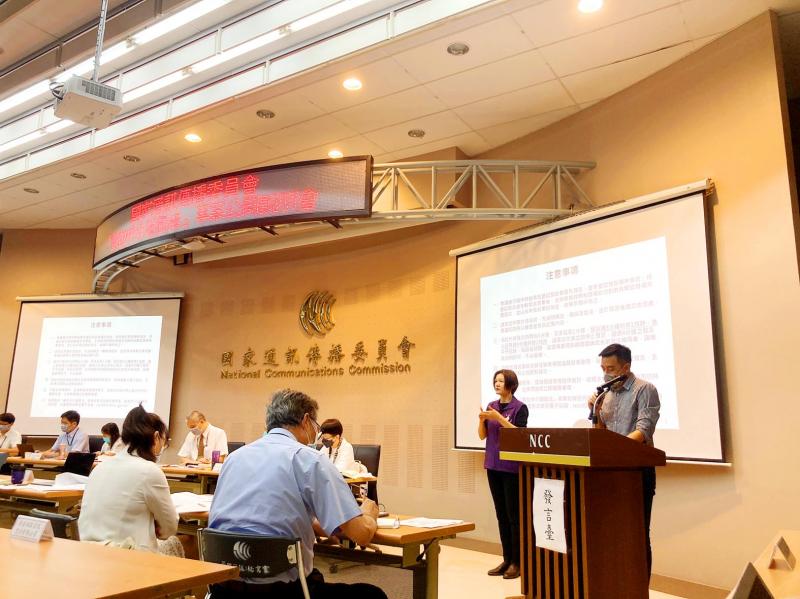Noncommercial online platforms should not be regulated by the digital intermediary service act, the Professional Technology Temple (PTT) bulletin board system yesterday said in an information session organized by the National Communications Commission (NCC).
“The draft act stipulates that platforms with more than 2.3 million active users would be categorized as ‘designated online platform operators’ and would be subject to more obligations required by the NCC,” PTT legal consultant Hsu Che-jen (許哲仁).
“Although we have yet to reach that threshold, we believe that the government should only impose more obligations on large commercial platforms. As a noncommercial platform with very limited resources, PTT would have no way to fulfill obligations required by the government,” Hsu said. “Categorizing us as a designated online platform operator would be no different from asking us to shut down the entire operation.”

Photo: Chen Hsin-yu, Taipei Times
The draft act would limit the actions that platform operators can take to sanction users who repeatedly disseminate illegal content, such as those who share child pornography, Hsu said.
“These users must first be warned by platform operators, who are entitled to suspend users’ access to platforms for a reasonable amount of time only if they refuse to change their ways,” he said. “Based on the draft act, platform operators must not suspend their access to the platforms immediately without administering correctional measures first, or they will be fined NT$500,000 to NT$5 million [US$16,672 to US$166,717].”
The draft act also allows such users to counter the restrictions imposed by platform operators through mechanisms on the platforms if the operators fail to follow due process to suspend access, he said.
“The draft act would empower malefactors by allowing them to spread illegal content at least two times and leave platforms without quicker and more effective means to handle them,” he said, adding the draft act should leave room for an immediate intervention by platform operators.
Rather than requiring platform operators to fulfill so many obligations, the government should stipulate special legislation to target groups that spread false information online or exploit online platforms for illegal gain, Hsu said.
Representatives of commercial platforms said that there are practical issues they would encounter should the draft act be enforced.
“Suppose User A posted a message on the platform accusing a political candidate of plagiarism, and User B said that the accusation was false. Since I have no way of knowing which one of them is correct, I might choose to eliminate both comments just to avoid being responsible for them. However, doing so will infringe on users’ freedom of speech,” said Chen Chien-jen (陳建仁), deputy executive director of Bahamut, a Taiwanese gamers’ platform.
Line Taiwan senior public policy director Crystal Hsu (許惠嵐) said that the draft act should clearly define the types of service that would be regulated, so service providers can more accurately calculate compliance costs.
“We want to know if the government plans to flag the content in one-on-one conversations, or conversations in chat groups,” Crystal Hsu said. “On Line, private conversations are encrypted, and we cannot intervene in those conversations.”
The draft act gives government agencies the authority to apply for information restraining order from a district court if they find illegal content on online platforms. Before obtaining the restraining orders, government agencies could request platform operators to flag the content by showing a pop-up alert next to it.
“We believe that only the court has the authority to decide whether a certain message is disinformation or illegal content. There should not be a back door for government agencies to greatly expand their authority and infringe on the privacy of people,” she said.
Meta Platforms, which owns Facebook, told NCC officials that the draft act should establish an agency that is responsible for handling accountability issues of multiple stakeholders.
Enforcement rules related to the draft act must be clear and effective, and conform to the principle of proportionality, while accountability mechanisms should be flexible to strengthen the digital economy, Meta said.

The Grand Hotel Taipei on Saturday confirmed that its information system had been illegally accessed and expressed its deepest apologies for the concern it has caused its customers, adding that the issue is being investigated by the Ministry of Justice Investigation Bureau. The hotel said that on Tuesday last week, it had discovered an external illegal intrusion into its information system. An initial digital forensic investigation confirmed that parts of the system had been accessed, it said, adding that the possibility that some customer data were stolen and leaked could not be ruled out. The actual scope and content of the affected data

DO THEY BITE IT? Cats have better memories than people might think, but their motivation is based entirely around the chance of getting fed Cats can remember the identity of the people who fed them the day before, Taipei-based veterinarians said on Friday, debunking a popular myth that cats have a short memory. If a stray does not recognize the person who fed them the previous day, it is likely because they are not carrying food and the cat has no reason to recognize them, said Wu Chou Animal Hospital head Chen Chen-huan (陳震寰). “When cats come to a human bearing food, it is coming for the food, not the person,” he said. “The food is the key.” Since the cat’s attention is on the food, it

A New York-based NGO has launched a global initiative to rename the nation’s overseas missions, most of which operate under the name "Taipei," to "Taiwan Representative Office (TRO)," according to a news release. Ming Chiang (江明信), CEO of Hello Taiwan, announced the campaign at a news conference in Berlin on Monday, coinciding with the World Forum held from Monday through Wednesday, the institution stated in the release. Speaking at the event, Democratic Progressive Party Legislator Huang Jie (黃捷) said she believed this renaming campaign would enable the international community to see Taiwan

DEFENSE: The US should cancel the US visas or green cards of relatives of KMT and TPP lawmakers who have been blocking the budget, Grant Newsham said A retired US Marine Corps officer has suggested canceling the US green cards and visas of relatives of opposition Taiwanese lawmakers who have been stalling the review of a proposed NT$1.25 trillion (US$39.7 billion) special defense budget. The Executive Yuan has proposed the budget for major weapons purchases over eight years, from this year to 2033. However, opposition lawmakers have refused to review the proposal, demanding that President William Lai (賴清德) first appear before the Legislative Yuan to answer questions about the proposed budget. On Thursday last week, 37 bipartisan US lawmakers sent a letter to Legislative Speaker Han Kuo-yu (韓國瑜), the heads